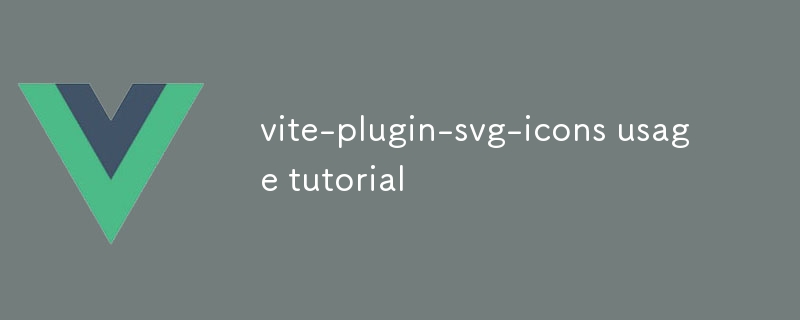Rumah >hujung hadapan web >View.js >tutorial penggunaan vite-plugin-svg-icons
tutorial penggunaan vite-plugin-svg-icons
- DDDasal
- 2024-08-15 14:36:23840semak imbas
Vite-plugin-svg-icons is a Vite plugin that facilitates SVG icon embedding in Vite projects. This guide explains its usage, including direct SVG file importing and leveraging the provided icon component. Additionally, it covers configuration options

Vite-plugin-svg-icons Usage Guide: How to Embed SVG Icons in Vite Projects?
Vite-plugin-svg-icons is a Vite plugin that allows you to embed SVG icons in your Vite projects. To use the plugin, first install it using npm:
<code class="shell">npm install --save-dev vite-plugin-svg-icons</code>
Then, add the plugin to your Vite config file:
<code class="js">// vite.config.js
export default {
plugins: [svgIconsPlugin()]
};</code>
Once the plugin is installed and configured, you can start using it to embed SVG icons in your project. There are two ways to do this:
-
Directly import SVG files: You can directly import SVG files using the
importstatement, and the plugin will automatically convert them to inline SVGs. For example:
<code class="js">// main.js import HomeIcon from './home.svg'; // ...</code>
-
Use the
iconcomponent: You can also use theiconcomponent provided by the plugin to render SVG icons. To use the component, pass the SVG icon path to thesrcprop, and the component will render the icon:
<code class="js">// main.js
import { Icon } from 'vite-plugin-svg-icons';
// ...
<Icon icon="./home.svg" /></code>
Understanding Vite-plugin-svg-icons: How to Configure and Optimize Icon Usage?
Vite-plugin-svg-icons provides a number of options to configure and optimize the usage of SVG icons in your project. These options can be passed to the svgIconsPlugin() function when you configure the plugin in your Vite config file.
Here are some of the most useful options:
- iconDisplayMode: This option controls how SVG icons are displayed in your project. You can choose between "inline" (default) or "component".
-
ignoreSVGExt: This option allows you to ignore specific file extensions when converting SVGs to inline icons. For example, you could ignore
*.svgzfiles to avoid converting them to inline SVGs. - defaultExport: This option specifies the default export for SVG icons. You can choose between "icon" (default) or "symbol".
-
customIconsFolder: This option allows you to specify a custom folder where you want to store your SVG icons. The default folder is
src/icons.
Practical Steps with Vite-plugin-svg-icons: How to Integrate Custom Icons into Your Application?
To integrate custom icons into your Vite application using Vite-plugin-svg-icons, you can follow these steps:
- Create a folder for your custom icons, such as
src/icons. - Place your SVG icon files in this folder.
- Import the SVG icon files into your component files using the
importstatement, or use theiconcomponent provided by the plugin. - Use the SVG icons in your application as needed.
Here is an example of how to use a custom SVG icon in a Vue component:
<code class="js">// MyComponent.vue
<template>
<div>
<Icon icon="./my-icon.svg" />
</div>
</template>
<script>
import { Icon } from 'vite-plugin-svg-icons';
export default {
components: {
Icon
}
};
</script></code>Atas ialah kandungan terperinci tutorial penggunaan vite-plugin-svg-icons. Untuk maklumat lanjut, sila ikut artikel berkaitan lain di laman web China PHP!

